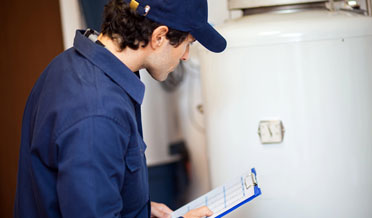Water Heater: Where to Place It and How Big Should It Be
Ahhhhhh! There is nothing like starting (or ending) your day with a hot shower! There are lots of things we do every day that use hot water, from washing our hands to cleaning dishes safely. These daily functions are made possible by a residential water heater. In most homes, that is a water tank, stored in a convenient mechanical space. But how much do you really know about the water tank in your home?
However, it is best that homeowners know a little about these essential appliances since they will need to be replaced about every 20 years or so. Here are some key facts to help someone determine a replacement hot water heater model for their home.
Fuel Types
Like most appliances and building systems, water heaters are available with either natural gas/propane or electricity as the heating fuel. Natural gas utilities are not available in all locations, so this might determine the choice of fuel available in your home.
- Electric water heaters are slightly more efficient than gas heaters.
- Gas water heaters can heat water slightly faster than electric heaters.
To Tank or Not to Tank
Conventional construction has offered tanked water heaters until a tankless system became available. If you need to replace your tank, this option might be the way to go.
- Instead of a large tank taking up space, tankless systems are small (less than two cubic feet in most cases) attached to the wall.
- Tankless systems are also powered by natural gas or are electric.
- Water is heated on demand and is available immediately. There is no storage tank to keep warm 24/7, so both natural gas and electric versions save energy/money.
- The price tag of tankless systems is higher than the tanked version, but the energy cost savings will make up for the higher initial cost.
Sizing Both Tanked and Tankless Systems
How much hot water does your family need at any one period of time? This determines the size of the system needed to cover the need.
- There is no advantage to buying a larger tank than needed. The larger tank will be more expensive and will waste energy (cost money) for years to come.
- There is no advantage to buying a smaller tank than needed. This means someone will experience a cold shower each morning and force the tank to work harder than normal to keep up with the demand.
- A tankless system may not be able to keep up with the demand, since it has a limited amount of water it can heat per minute. However, it is not difficult to install additional tankless units to enhance comfort.
Three things determine tank (or tankless) size.
- The number of people using hot water
- The number of devices using hot water
- The usage schedule of hot water use
Tanked systems come in 5-gallon increments, starting at 30 gallons. A family of 1 or 2 people will need a tanked system between 30 and 40 gallons, a family of 4 will require a 50-gallon tank, and a family of 5 or more will need a 55-gallon tank or larger. If a family MUST run the washing machine or dishwasher at the same time as the family is showering, a larger tank will be required.
Tankless systems are sized by flow rate, measured in gallons per minute available.
- A 3.5 GPM heater provides the equivalent of a 30-gallon tank
- A 5 GPM heater provides the equivalent of a 40 to 50-gallon tank
- 10 GPM heaters will provide water equivalent to a 55-gallon tank and above.
How Can Doctor Cool Help With Your Water Heater Replacement
Let Doctor Cool help you decide where to place your water heater and how to choose the right size for your home. Maximize efficiency, performance, and energy savings with the right setup from Doctor Cool. We have been helping homeowners with water heater installation and repair, and prevent plumbing-related problems for decades. Call us today at 281-338-8751.
